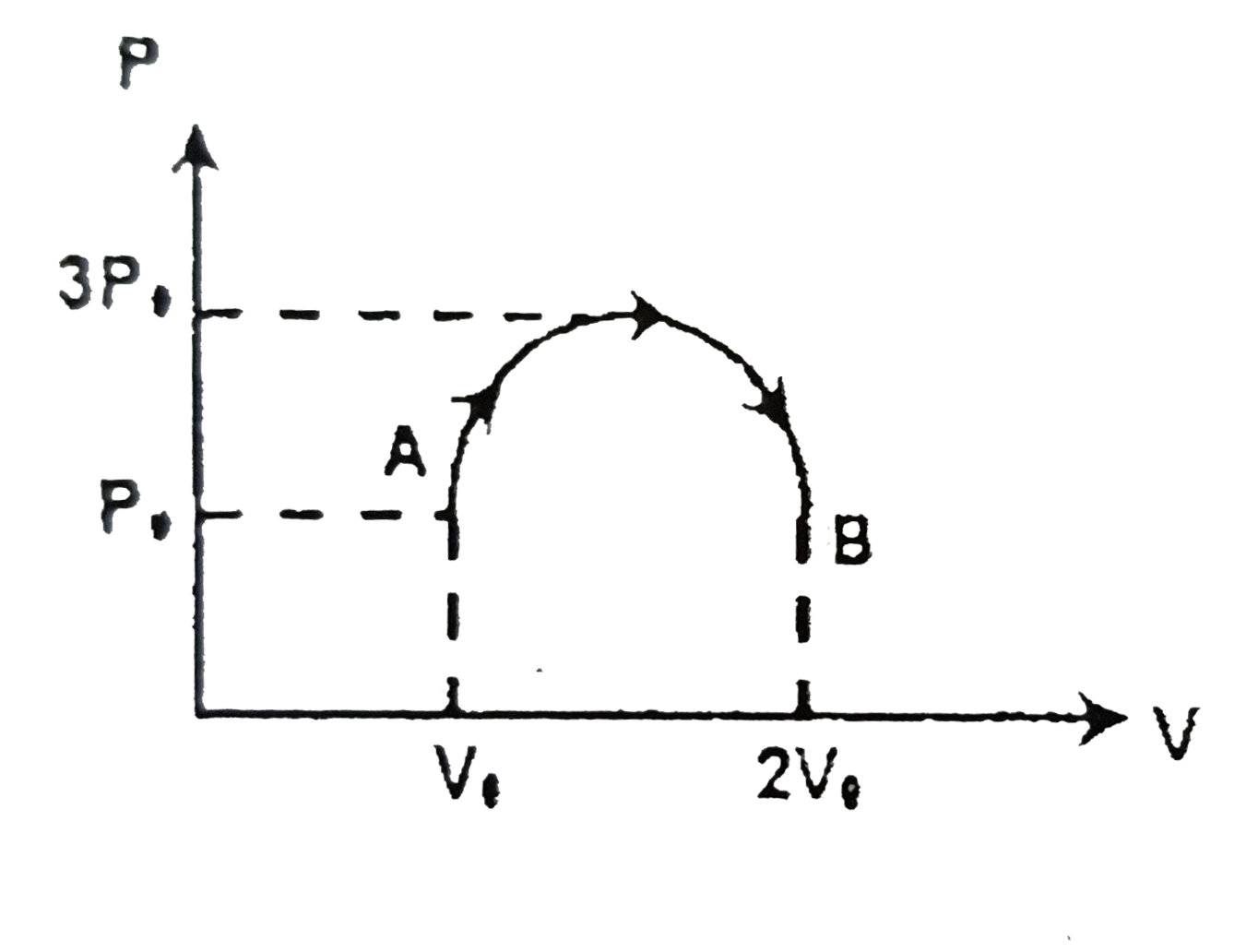A certain amount of an ideal monoatomic gas undergoes a thermodynamic process such that VT2= constat where V= volume of gas, T= temperature of gas. Then under process
When heat is supplied to gas its temperature will increase
the coefficient of volume extension of gas equals −2T
The molar heat capacity of gas is 2R
When heat is supplied to the gas its temperature decreases.
The correct Answer is:B, D
To solve the problem, we need to analyze the thermodynamic process described by the equation VT2=constant, where V is the volume and T is the temperature of an ideal monoatomic gas. We will derive the molar heat capacity and other properties step by step.
1. Understanding the Given Relation:
We start with the relation VT2=C, where C is a constant. This implies that as the volume V changes, the temperature T must change in such a way that the product VT2 remains constant.
2. Expressing Pressure:
For an ideal gas, we can use the ideal gas law:
PV=nRT
Rearranging gives us:
P=nRTV
3. Substituting for Temperature:
From the relation VT2=C, we can express T as:
T=√CV
4. Substituting T in the Pressure Equation:
Now substituting T into the pressure equation, we have:
P=nR√CVV=nR√CV3/2
This shows that PV3/2=constant.
5. Identifying the Process:
The equation PVn=constant indicates that this is a polytropic process where n=32.
6. Calculating Molar Heat Capacity:
The molar heat capacity C for a polytropic process is given by:
C=CV+Rn−1
For a monoatomic ideal gas, CV=3R2. Substituting n=32:
C=3R2+R32−1=3R2+R12=3R2+2R=7R2
7. Interpreting the Result:
The calculated molar heat capacity C=7R2 indicates that when heat is supplied to the gas, the temperature will increase, which contradicts the earlier assumption of a negative heat capacity.
8. Coefficient of Volume Expansion:
To find the coefficient of volume expansion β, we use the relation:
β=ΔV/VΔT/T
From the relation VT2=C, we differentiate:
dV⋅T2+V⋅2T⋅dT=0
Rearranging gives:
dVV=−2dTT
Thus, the coefficient of volume expansion is:
β=−21T
Final Answers
- The molar heat capacity C is 7R2.
- The coefficient of volume expansion β is −2T.
We start with the relation VT2=C, where C is a constant. This implies that as the volume V changes, the temperature T must change in such a way that the product VT2 remains constant.
For an ideal gas, we can use the ideal gas law:
PV=nRT
Rearranging gives us:
P=nRTV
From the relation VT2=C, we can express T as:
T=√CV
Now substituting T into the pressure equation, we have:
P=nR√CVV=nR√CV3/2
This shows that PV3/2=constant.
The equation PVn=constant indicates that this is a polytropic process where n=32.
The molar heat capacity C for a polytropic process is given by:
C=CV+Rn−1
For a monoatomic ideal gas, CV=3R2. Substituting n=32:
C=3R2+R32−1=3R2+R12=3R2+2R=7R2
The calculated molar heat capacity C=7R2 indicates that when heat is supplied to the gas, the temperature will increase, which contradicts the earlier assumption of a negative heat capacity.
To find the coefficient of volume expansion β, we use the relation:
β=ΔV/VΔT/T
From the relation VT2=C, we differentiate:
dV⋅T2+V⋅2T⋅dT=0
Rearranging gives:
dVV=−2dTT
Thus, the coefficient of volume expansion is:
β=−21T
- The molar heat capacity C is 7R2.
- The coefficient of volume expansion β is −2T.
Similar Questions
A certain amount of ideal monoatomic gas undergoes a process given by TV1/2= constant. The molar specific heat of the gas for the process will be given by
View SolutionA monatomic gas undergoes a thermodynamic process such that T∝V−27 (T = temperature and V = volume of the gas) As heat is supplied to the gas, choose INCORRECT option.
View SolutionOne mole of an ideal monoatomic gas is taken through a polytropic process P2T = constant. The heat required to increase the temperature of the gas by ΔT is
View SolutionTwo moles of an ideal mono-atomic gas undergoes a thermodynamic process in which the molar heat capacity 'C' of the gas depends on absolute temperature as C=RTT0, where R is gas consant and T0 is the initial temperature of the gas. (V0 is the initial of the gas). Then answer the following questions:
The equation of process is
View SolutionTwo moles of an ideal mono-atomic gas undergoes a thermodynamic process in which the molar heat capacity 'C' of the gas depends on absolute temperature as C=RTT0, where R is gas consant and T0 is the initial temperature of the gas. (V0 is the initial of the gas). Then answer the following questions:
The minimum volume of gas is
View Solution0.5 moles of an ideal monoatomic gas undergoes a thermodynamic process from A to B as shown in figure. The change in internal energy of the gas during the process from A to B is
View Solutionan ideal diatomic gas undergoes a polytropic process described by the equation P√V=constant . The molar heat capacity of the gas during this process is
View SolutionOne mole of an ideal monoatomic gas is taken through the thermodynamic process shown in the P−V diagram. The heat supplied to the system is

View SolutionOne mole of a diatomic gas undergoes a thermodynamic process, whose process equation is P∝V2. The molar specific heat of the gas is
View SolutionAn ideal monoatomic gas follows a thermodynamic process as shown in pressure-volume (P-V) plot. The work done in process AB is

View Solution

